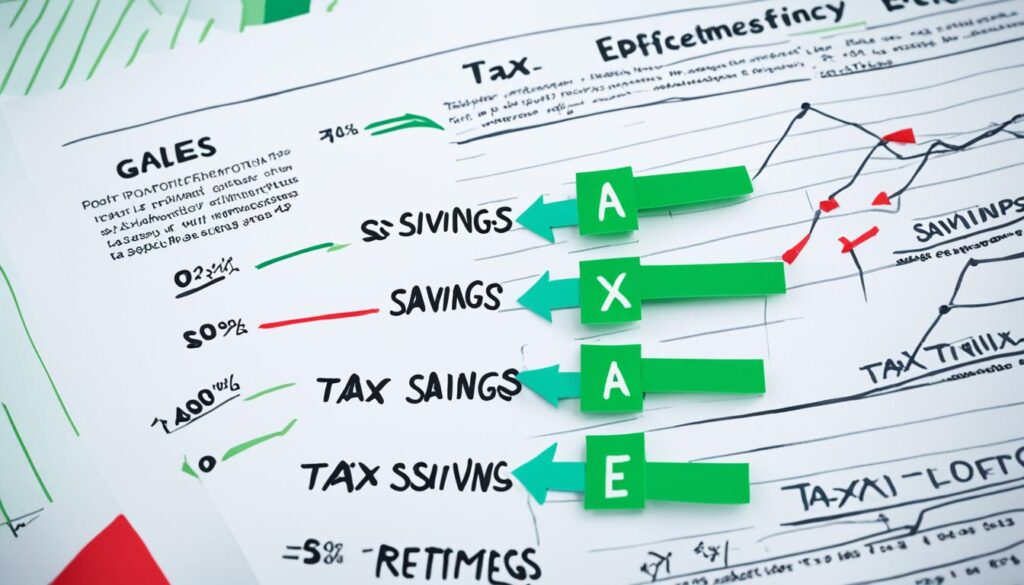As we enter the year 2024, it’s crucial for investors to implement smart tax strategies to optimize their financial growth. With wider tax brackets, a higher standard deduction, and expanded saving opportunities, there are new possibilities to save on taxes. Some key tax-planning strategies to consider include maximizing deductions, using tax-smart investing strategies, seeking guidance from tax advisors and financial professionals, and taking advantage of tax-saving incentives such as HSA and IRA contributions.
When it comes to maximizing your tax savings, knowledge is power. By staying informed about the latest tax laws and regulations, you can make informed decisions that will have a positive impact on your finances. So let’s dive into some effective tax strategies that can help you make the most of your investments in 2024.
Key Takeaways:
- Maximize deductions to reduce your taxable income.
- Utilize tax-smart investing strategies to grow your wealth while minimizing taxes.
- Consult with tax advisors and financial professionals for expert guidance.
- Take advantage of tax-saving incentives like HSA and IRA contributions.
- Stay informed about the latest tax laws and regulations to make informed decisions.
By implementing these tax strategies, you can optimize your financial growth and achieve your long-term investment goals. Let’s explore each of these strategies in more detail and discover how they can put you on the path to financial success in 2024.
Seize Available Deductions and Increase Savings Incentives
For the year 2024, the IRS has made notable changes to tax brackets and standard deduction amounts, potentially offering taxpayers the opportunity to lower their income taxes. It is crucial to explore the various deductions available, including both standard and itemized deductions, to minimize your taxable income further.
When considering itemized deductions, it’s important to assess expenses such as state and local taxes, medical and dental expenses, home mortgage interest, and charitable donations. These deductions can significantly reduce your taxable income, potentially surpassing the standard deduction amount. By taking advantage of itemized deductions, you have the opportunity to optimize your tax savings.
Charitable donations, in particular, can serve as a powerful means of reducing your tax liability. When giving to qualified organizations, you not only contribute to meaningful causes but can also enjoy tax benefits. By tracking these donations and properly documenting them, you can claim deductions that lower your taxable income even further.
“Maximizing your deductions is essential when it comes to lowering your taxable income. By carefully considering all qualified expenses, you can potentially save a significant amount on your taxes.”
In addition to deductions, it is equally important to explore various savings incentives provided by the IRS. Contributing to retirement accounts such as Individual Retirement Accounts (IRAs) and Health Savings Accounts (HSAs) can offer tax advantages while helping you prepare for the future.
When you contribute to an IRA, you can potentially reduce your taxable income while benefiting from tax-deferred growth. This means your money grows without being subject to taxes until withdrawal, allowing for potential savings to compound over time.
Similar to IRAs, Health Savings Accounts (HSAs) also offer tax advantages. Contributions made to an HSA are tax-deductible, and the funds can grow tax-free. Withdrawals from an HSA for qualified medical expenses are also tax-free, providing additional savings opportunities.
For individuals planning for future education expenses, contributing to a 529 college savings account can be a beneficial tax-saving strategy. These accounts provide tax-free growth as long as the funds are used for qualified education expenses. By utilizing these tax-advantaged accounts, you can save for education while potentially reducing your tax liability.
Summary of Deductions and Savings Incentives:
| Deduction or Incentive | Description |
|---|---|
| Standard Deduction | Increased for 2024, providing lower income taxes for many taxpayers. |
| Itemized Deductions | Consider expenses such as state and local taxes, medical and dental expenses, home mortgage interest, and charitable donations to reduce taxable income. |
| Charitable Donations | Make qualified contributions and claim deductions to reduce taxable income. |
| IRA Contributions | Contribute to an IRA to potentially lower taxable income and benefit from tax-deferred growth. |
| HSA Contributions | Utilize tax-deductible contributions to an HSA and enjoy tax-free growth and withdrawals for qualified medical expenses. |
| 529 College Savings Accounts | Save for education expenses while taking advantage of tax-free growth. |
By seizing available deductions and increasing your savings incentives through contributions to retirement and education accounts, you can effectively reduce your taxable income and optimize your tax savings for the year 2024. Consider working with a qualified tax advisor to ensure you take full advantage of these opportunities and maximize your overall financial well-being.
Optimize Your Portfolio for Tax Efficiency
When it comes to investing, it’s not just about maximizing returns; it’s also about minimizing taxes. By employing tax-efficient investing strategies, you can make the most of your investment gains while minimizing the impact of taxes. Here are some key tactics to consider:
Asset Location
Strategically allocating your assets between taxable and tax-deferred accounts is known as asset location. This strategy involves holding investments that generate interest income taxable at income tax rates, such as bonds and CDs, in tax-deferred accounts. By doing so, you can help minimize taxes and potentially increase overall after-tax returns.
Tax-Loss Harvesting
Tax-loss harvesting is a technique that involves selling investments that have experienced a loss to offset gains in other investments. By strategically realizing losses, you can reduce your taxable income and potentially lower your overall tax liability. This strategy requires careful monitoring of your portfolio and an understanding of tax regulations.
Roth Conversion
Roth conversion can be a powerful strategy to optimize your tax situation. This process involves transferring money from a traditional IRA to a Roth IRA. While you’ll need to pay taxes on the converted amount, future growth in the Roth IRA is tax-free. By converting to a Roth IRA, you can potentially enjoy tax-free growth and tax-free withdrawals in retirement.
Tax-Efficient Withdrawals
When it’s time to withdraw funds from your investment portfolio, taking a tax-efficient approach is essential. By carefully managing your withdrawals, you can minimize the tax impact and maximize your after-tax income. This may involve considering the timing of withdrawals, the order in which you tap into different types of accounts (taxable, tax-deferred, tax-free), and other factors to optimize your tax situation.
Bond Investments
Investing in bonds can play a role in a tax-efficient portfolio strategy. Bonds generally generate interest income, which is taxable. By allocating bond investments to tax-deferred accounts, you can minimize the tax impact of that income. This strategy is particularly beneficial for high-income individuals in higher tax brackets.
Taking a tax-efficient approach to investing can have a significant impact on your overall investment returns. By optimizing your portfolio for tax efficiency, you can potentially save thousands of dollars in taxes and increase your after-tax income. It’s essential to work with a financial professional who understands the intricacies of tax-efficient investing and can help you implement the right strategies for your unique situation.
Suggested asset allocation for tax-efficient investing:
| Account Type | Suggested Allocation |
|---|---|
| Taxable Account | Equities (stocks) |
| Tax-Deferred Account (e.g., Traditional IRA, 401(k)) | Fixed-income (bonds), Real Estate Investment Trusts (REITs) |
| Tax-Free Account (e.g., Roth IRA) | Equities (stocks), high-growth investments |

Get Expert Guidance and Revisit Your Financial Plan
When it comes to your financial plan, seeking a second opinion can provide valuable insights and help you optimize your investment and tax strategies. Whether you consult with a financial advisor or a professional financial planner, their expertise can make a significant difference in your financial success.
These professionals have the knowledge and experience to review your current plan, identify potential areas for improvement, and provide recommendations tailored to your specific situation. They can help you reduce investment fees by suggesting cost-effective investment options and strategies. By optimizing asset allocation, they can ensure that your portfolio is balanced and aligned with your financial goals.
One crucial aspect of your financial plan that an expert can assist you with is creating a tax-efficient withdrawal strategy. This involves determining the most advantageous way to withdraw funds from your accounts to minimize the tax impact and maximize your income in retirement.
Research has shown that professional financial advice can add significant value to portfolio returns over the long term. By leveraging their expertise and guidance, you can navigate complex financial decisions, reduce unnecessary costs, and optimize your overall financial plan.
“Receiving professional financial advice is not just a luxury—it’s an investment in your financial future.” – Jane Smith, Certified Financial Planner
By working with a trusted financial advisor or planner, you can gain peace of mind knowing that your financial plan is well-structured and aligned with your goals. They will help you stay on track, make informed decisions, and adapt to any changes in your financial circumstances or the market.
Remember, your financial journey is unique, and expert guidance can provide the personalized support you need to achieve your financial aspirations. Don’t underestimate the benefits of consulting with professionals who can help you optimize your financial plan, reduce investment fees, and make tax-efficient account withdrawals.
Expert Guidance Checklist:
- Consult with a financial advisor or a professional financial planner to receive a second opinion on your financial plan.
- Ask for recommendations to reduce investment fees and explore cost-effective investment options.
- Optimize your asset allocation to align with your financial goals.
- Create a tax-efficient withdrawal strategy in coordination with your advisor or planner.
- Regularly review and update your financial plan to adapt to changing circumstances.

Having professional financial advice on your side can be a game-changer. With their guidance, you can navigate the complexities of financial management, optimize your investment and tax strategies, and work towards financial success.
| Benefits of Expert Guidance | How it Helps |
|---|---|
| Optimized financial plan | Experts identify areas for improvement and customize your plan to align with your goals. |
| Reduced investment fees | Professionals recommend cost-effective investment options to minimize fees. |
| Improved asset allocation | Optimizing your asset allocation helps diversify and balance your portfolio for long-term growth. |
| Tax-efficient account withdrawals | Experts help you create a withdrawal strategy that minimizes tax impact and maximizes retirement income. |
Conclusion
Implementing smart tax strategies is crucial for investors to maximize their savings and achieve financial success. By seizing available deductions, maximizing tax-saving incentives, optimizing portfolio tax efficiency, seeking expert guidance, and revisiting your financial plan, you can reduce your tax burden and increase your savings. staying informed about the latest tax laws and regulations is essential to make the most of your tax planning opportunities. With careful planning and smart tax strategies, you can unlock tax-efficient wealth growth and secure a brighter financial future in 2024.
FAQ
What are some key tax-planning strategies individuals can consider?
Some key tax-planning strategies individuals can consider include maximizing deductions, utilizing tax-smart investing strategies, seeking guidance from tax advisors and financial professionals, and taking advantage of tax-saving incentives such as HSA and IRA contributions.
How can individuals maximize deductions and increase savings incentives?
Individuals can maximize deductions by considering possible itemized deductions such as state and local taxes, medical and dental expenses, home mortgage interest, and charitable donations. They can also take advantage of tax-saving incentives like contributing to an IRA, HSA, or 529 college savings account.
How can individuals optimize their investment portfolio for tax efficiency?
Individuals can optimize their investment portfolio for tax efficiency by strategically allocating assets in taxable and tax-deferred accounts, utilizing asset location strategies. They can also consider tax-loss harvesting, Roth conversions, and implementing a tax-efficient withdrawal strategy.
Should individuals seek expert guidance and revisit their financial plan for tax optimization?
Yes, seeking a second opinion on your financial plan from a financial advisor or professional financial planner can provide valuable insights and help optimize your investment and tax strategies. Experts can review your plan, identify potential areas for improvement, and guide you in optimizing asset allocation and creating a tax-efficient withdrawal strategy.
How important are smart tax strategies for maximizing savings and financial success?
Implementing smart tax strategies is crucial for investors to maximize their savings and achieve financial success. By seizing available deductions, maximizing tax-saving incentives, optimizing portfolio tax efficiency, seeking expert guidance, and revisiting your financial plan, you can reduce your tax burden and increase your savings, leading to a brighter financial future.
Source Links
- https://investor.vanguard.com/investor-resources-education/article/effective-tax-saving-strategies-for-investors
- https://www.fidelity.com/learning-center/personal-finance/tax-moves
- https://www.investors.com/etfs-and-funds/personal-finance/investment-and-tax-planning-moves-to-boost-your-bottom-line-in-2024/


